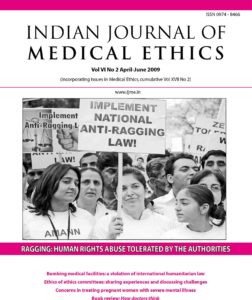
The death of Aman Kachru from a severe beating by his seniors in medical college has brought “ragging” back into the public eye. An editorial notes that students who participate in this institutionalised bullying cannot become good doctors. Authorities must recognise “ragging” for what it is-a violation of human rights.
Thirty years after the ICMR’s guidelines on ethics committees, and despite the exponential increase in clinical trials in India, we know nothing about the functioning of ECs across the country. An editorial launches a column on the ethics of ethics committees, arguing that EC members have an ethical duty to discuss the challenges they face. This issue also carries the findings of a survey of EC members of 12 Pune-based research organisations.
The recent attacks on medical facilities in Palestine and Sri Lanka are violations of the Geneva Convention. An editorial in this issue discusses the ethical basis for providing protection to hospitals.
The treatment of mental illness that occurs during pregnancy can pose special concerns. Clinicians present some of the ethical challenges faced by the treating team at a perinatal psychiatric clinic in Bangalore. Another paper highlights the need for a code of ethical conduct for clinical psychologists-a mechanism that holds practising individuals accountable for their behaviour.
A commentary on teaching ethics in unethical institutional settings argues that “doing nothing” goes directly against the principles of “doing good” and “avoiding harm”. Practitioners of medicine have a moral obligation to protect, uphold and nurture the cause of ethics-in theory and in practice.
Access is the single most important ethical issue in healthcare. A doctor practising in a rural area describes the circumstances of the 720 million people in India who struggle to get the treatment that is their right.
